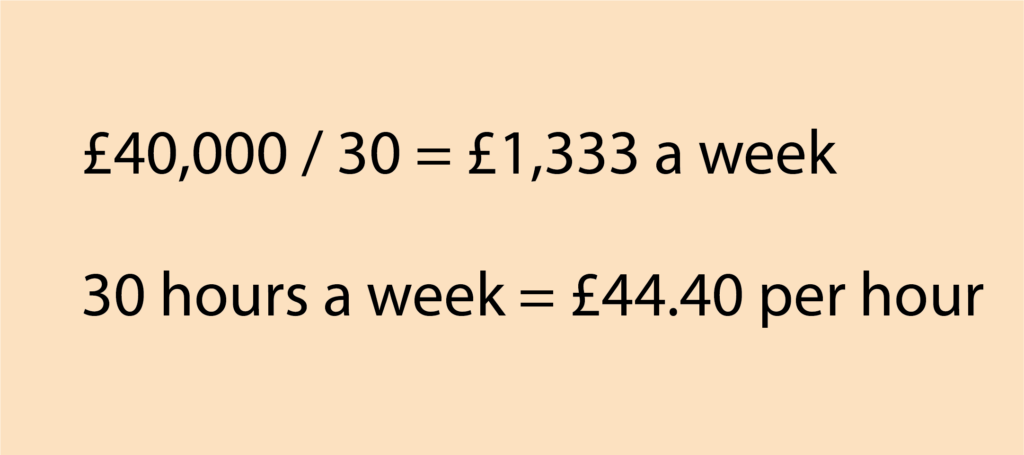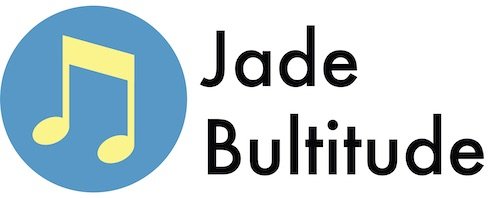Charging for private music lessons as a music teacher can be a complicated decision: how much am I worth, What is the going rate in my area and will I get enough students at this price are all important factors. In this post I will look at all the things you should consider when setting your prices for the school year.
How much do you want to make?
One of the first things you should consider as a music teacher is how much do you want to make in a year, when coming up with your yearly figure make sure that you consider your living expenses and how much you want to or can work. Having a goal in mind can help you backwards work what your lesson cost will be. By knowing how much you want to make in a year and how many hours you want to/can work a week you can come up with an hourly rate from here.
Now obviously this cannot be the only step as there are other factors you need to consider, but let’s have a look at an example of how this could work.
Let’s say you want to make £40k a year. Roughly there are 30 teaching weeks in a year (often there are more but this is for example purposes!)
£40,000 divided by 30 means you will need to make £1333 a week. If you work 30 hours a week this will take you to £44.40 per hour! Obviously this figure does not take into account taxes or any other factors but this is a good place to start!

Figure out your costs
When thinking about pricing your lessons it is also important to consider what your costs will be. Will you be paying room rent or using a room in your home? If using a room in your home be sure to think about the relevant insurance and also think about how you will be kitting the room out. Electricity, instrument costs, furniture, music books, pens and pencils, photocopying, any software you use such as tom play or tone gym, ipad, laptop and sheet music are all valid costs to think about (and may be tax deductible!)
If you are not teaching from home and are renting a music studio for example, then you will need to take the monthly rent into consideration. My personal preference is to find a room or outside garden studio in your own home as you will most likely not be able to add the entire rental fee into the lesson cost (unless of course you get a really good deal!)
If neither of these are an option and instead you are driving to a student’s house, then your pricing for these lessons should be reflected as you are now no longer just charging for the 30 minute lesson, you must factor in travel time for home lessons.
Make sure to think which out of these costs will be weekly as it is these weekly costs that can influence your hourly rate as well.

Average Cost of Music Lessons In The UK
The musicians union in the UK currently states in 2023/2024 that lessons should be £40.50 per hour minimum so if you did your calculations above and it is a lower figure than this then you can afford to adjust your lesson pricing to match this.
Location Will Affect The Cost Of Music Lessons
Another factor is where you are teaching. Different areas of the country have different price points. I am all for you charging your worth but you will need to consider if you will actually get the students or if you will price yourself out of the market.
Look At Other Music Teachers
Do some research in your area, what are other music instructors charging in your area for similar lessons, what instruments are they teaching, how long are the lessons etc. You do not need to charge the same as what other teachers charge but you will need to find a way to justify what you are charging in order to get the clients. Take a look at the local music schools as well but do bare in mind that music schools are a fully fledged music business and they employ music instructors and will have to factor in their own costs into what their hourly rate is for teachers.
By looking around like this you will build a picture of the average price for lessons in your area. It is also worth noting the experience of the other instructors around you. Make sure to consider what the qualifications are of the teachers around you, where did they study, do they have a music degree and how long have they been teaching A professional musician can command more money than someone who has not studied to a professional level, same as any profession!
The Amount and Level of Competition in Your Area
By doing your research you will be able to see the level of competition in your area. Personally, the more teachers there are in your area the better because it means the market is strong, especially if those teachers are fully booked!
Your Teaching Experience
You must also be realisitic with your teaching experience. It is not fair on your students or yourself or other music teachers to overcharge. Remember people are paying for an outcome and if you do not have the experience to guarantee certain outcomes then you will have to reduce what you are charging. Until of course you have built up that experience then you can charge more to reflect this!
If you teach something very niche, for example if you teach rare instruments such as the harp or oboe, you can potentially charge more. There will be fewer teachers teaching the same instrument as you and chances are, you probably paid more to learn and for your instrument.
average rates for music lessons are in the UK, USA and Europe
Average Cost of Music Lessons in the UK
As we have seen above, the Musicians Union recommend a minimum rate of £40.50 per hour for teaching music lessons. This can vary greatly where you live in the UK but this is a great starting point when deciding what to charge for music lessons.
Average Cost Of Music Lessons In USA
The USA is very similar with the the average cost of music lessons in the USA being $57 USD per hour. You will often find that this figure will vary greatly depending on location, experience and other factors as we have seen!
Average Cost of Music Lessons In Europe
Europe is again very similar with the average cost for music lessons in Europe being roughly €40 Euro for 1 hour. Again, this figure will vary greatly depending on location, experience and the other factors that we have seen.
Teaching Multiple Instruments
Teaching multiple instruments is another great way to expand your potential students and have financial success. However, do ensure that you take your qualifications into account when offering other instruments and be upfront with your students if this is not your first study instrument.
For example many teachers will also offer piano lessons as well as their main study instrument as almost all instrumentalists will also have studied piano to a reasonable level.
Lesson Duration
Lesson duration is another factor as you cannot have the same lesson length for all. Beginner music students will not be able to do the same length lesson as more advanced students. Beginner students will require 20 minute or a half hour lesson weekly where students on higher levels will need longer lessons.
Some teachers will charge different rates for different length lessons and this is quite common. You can charge more for shorter lessons – shorter lessons means more students in the hour which results in more admin meaning the actual time spent working is longer. However, I would counteract this with students who are having longer music lessons are at a higher level and may require more consideration with the lesson plans. This is a personal choice, I tend to charge the same hourly rate and divide it pro rata with college students and higher level students sometimes paying more.
How Much to Charge for Group Music Lessons
Group lessons are another great way for music teachers to expand their income. Group lessons allow you to teach multiple students and this is excellent if your time is limited.
Group lessons can command 50% of your private rate for music lessons.
Online vs In-Person
My personal thoughts on online music lessons is that you should not reduce your fee for these. If you feel online lessons are not as good then don’t do them!
An online lessons require the same amount of time being put into the lesson and I would argue that it has the same if not more planning and prep time to teach music online. Online teaching will also require more equipment than your average music lesson so these are all things to consider.
When thinking about going down this route do make sure to consider how suitable it will be. For some learners, particularly beginners you may find that this isn’t the best route.
What About Discounts
I disagree with offering discounts. By offering a discount you are essentially reducing your hourly fee for music lessons. If you are offering in home lessons for students you could perhaps discount if the private lesson takes place at your own home but this is not really a discount more than you are saving the travel time.
Make your own call with this but remember this is your time and your own personal finance!
Offering sample lessons
A sample lesson and free trials can be useful right at the beginning of your teaching journey if you don’t have a reputation in the area yet it is a zero risk option for both yourself as a music teacher and the pupil or pupils parents.
If you are getting referrals and have a reputation I personally believe that it is not needed, you will also seem more exclusive if you are not giving your time for free. Consider this, Juilliard does not give a free trial before you apply!
The bottom line is, if you are a skilled worker it is ok to charge for music lessons! Teaching music lessons is not an easy job, it requires a huge amount of skill to teach music lessons, as well as organization et particularly for private music lessons. Timetabling, invoicing, planning etc for private lessons.
